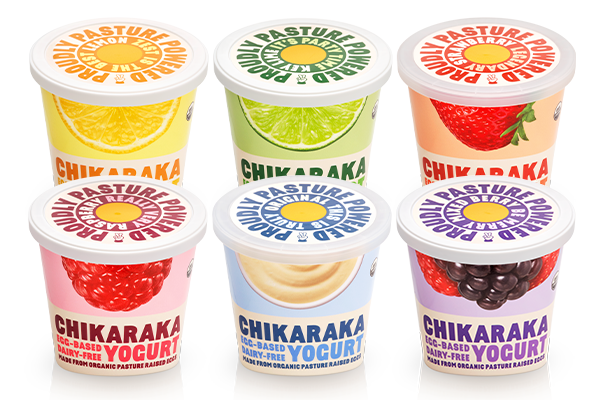It seems intuitive for dairy-free yoghurt products to go down a plant-based route, but one new brand is introducing a very unusual ingredient into the category – eggs.
Chikaraka, a non-dairy yoghurt product made with pasture-raised, organic eggs, is expected to launch this summer by egg producer Handsome Brook Farms. The line, which comes in lemon, lime, mixed berry, raspberry and strawberry flavours, is promoted as a protein-packed snack made with clean ingredients.

The yoghurt cups, each of which contains one whole egg, promise to be an excellent example of a value-added product. They provide a good alternative for those with dairy allergies, and deliver all the benefits of an egg on top of that. With more than 10g of protein per serving and 6g or less of added sugars, there is a strong connection with the protein trend and people’s desire to reduce their sugar consumption. The use of eggs also delivers some nutrients whose benefits people are very familiar with: omega-3s, iron, vitamin D, and brain-fuelling choline.
Handsome Brook Farms’ existing image should also help these little yoghurt pots along. “Pasture-raised, organic egg production supports regenerative agriculture, animal welfare, healthy small farmer relationships, and better-tasting eggs,” says Jordan Czeizler, president of Handsome Brook Farms. A self-described “pioneer in pasture-raised organic egg production,” the company is already associated with ethical, sustainable practices and ‘natural’ food, and these positive associations should transfer to Chikaraka too – expanding its health halo.
Though Chikaraka has not yet launched, it will be interesting to see if it delivers on taste and texture as much as nutritional benefit. It has been described as a little sweet, a little tart, rich and creamy – very similar, then, to real dairy yoghurt. Provided it lives up to this promise, this will make it very attractive to yoghurt-lovers frustrated by an intolerance to dairy. In addition, the eggs supposedly create a thick and creamy product without the need for excessive starches, gums or stabilisers, adding to the more natural image – and extending the versatility of eggs even further.

